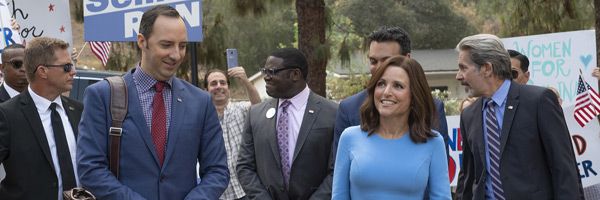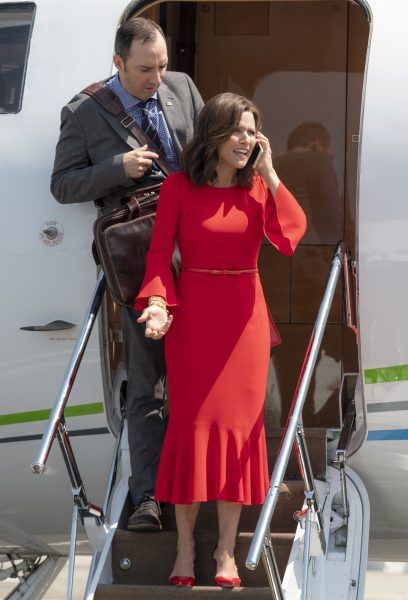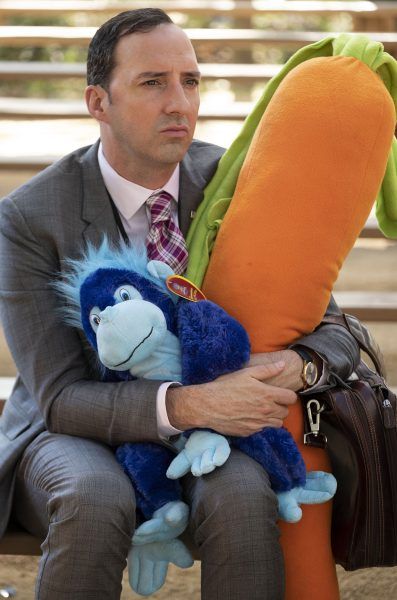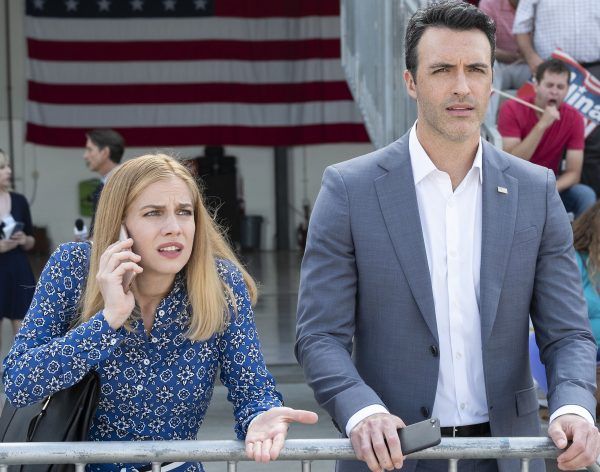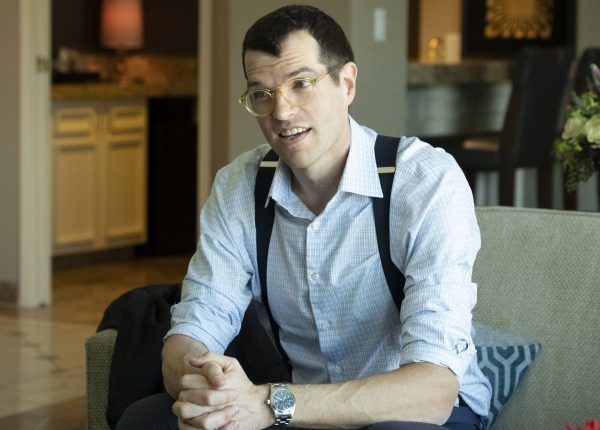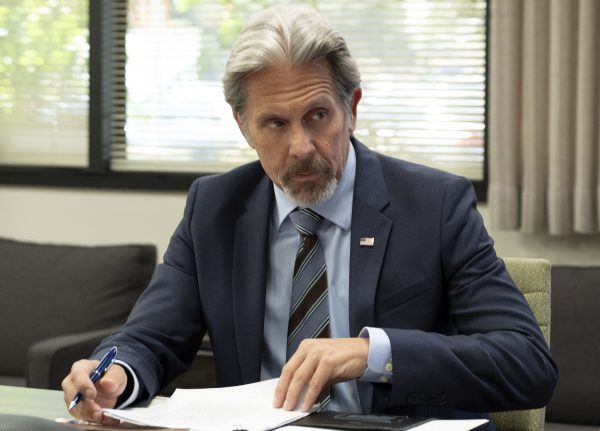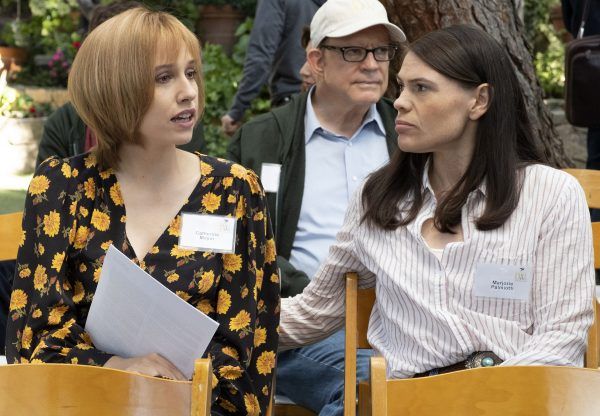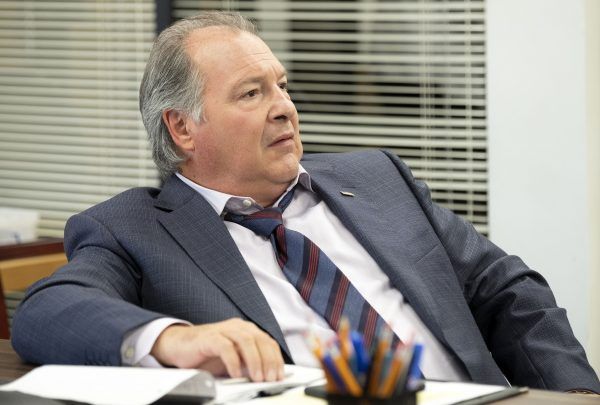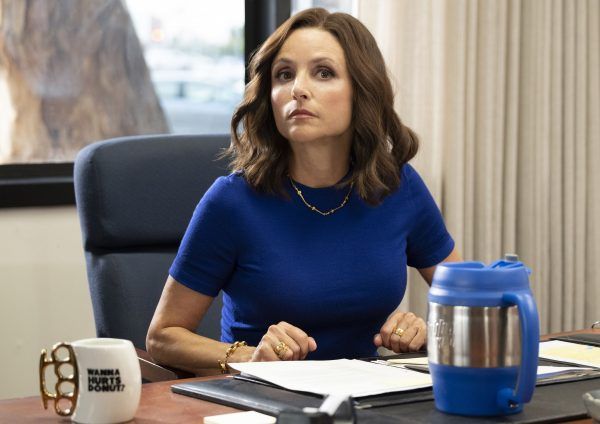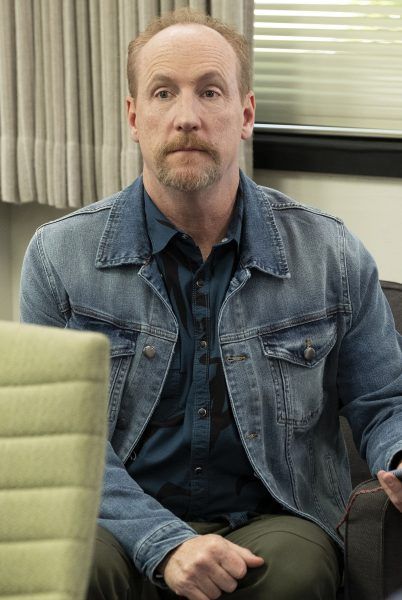The HBO comedy series Veep is back for its seventh and final season, with seven episodes that follow Selina Meyer (Emmy Award winner Julia Louis-Dreyfus) as she hits the campaign trail during her run for president. Navigating threats from primary challengers with the help of her band of misfits – including devoted bodyman Gary (Tony Hale), right hand Amy (Anna Chlumsky), campaign manager Ben (Kevin Dunn), analyst Kent (Gary Cole), unassuming staffer Richard (Sam Richardson) and daughter Catherine (Sarah Sutherland) – Selina will be dealing with adversaries and allies, on her road back to the Oval Office.
During this 1-on-1 interview with Collider, showrunner David Mandel, who took over duties on the series when show creator Armando Iannucci stepped away after the conclusion of Season 4, talked about how it feels when you know you’re making the final season, coming into the show as a fan himself, that his priority for the writers’ room was to hire people that make him laugh, why it was important for the episodic directors to have a great sense of humor, what his partnership with Julia Louis-Dreyfus has been like, how different the show might be if we lived in a different political climate, what prepared him for becoming a showrunner, how they approach improv on the show, and where he’d like to go next in his career.
Collider: How does it feel, when you know that you’re doing the final season?
DAVID MANDEL: It’s strange. The cancer, dare I say, changed everything. Not just the perspective and just obviously what’s important in life, but it also interrupted things and made you go, “Oh, right.” And so, when we came back to the season, the end snuck up on us a little bit more, the second time around, because we were just happy to be back, and happy to have [Julia Louis-Dreyfus] back, and be happy to be doing it. As we were planting the seeds of things to come, in these early episodes, we started thinking about it a little more. And at the very end, it really did sneak up on us. I was a writer for the end of Seinfeld, and I helped, but that wasn’t my idea. I wasn’t the architect, so that’s different than saying, “This is how it’s going to end.” I don’t know. It’s strange. I try to put blinders on, when it comes to what other people want out of it. You’ve just gotta forget that. Because I was a fan for four years of the show, and then I was guy #2 (the second showrunner, after Armando Iannucci left), I get to go, “What does me, the fan, want?” That sometimes gets to influence my writing, in a very fun way, that sometimes maybe being the writer doesn’t.
Is it fun to be able to come onto a show where you’re a fan, yourself, and then you get to play with those characters and are the one responsible for them?
MANDEL: It was great. It’s that sense of getting to go in the sandbox and all of the toys are there. That’s wonderful. Going back to that time, I was excited. I jumped right into it. People are always like, “Were you nervous?” I was like, “No, it’s so great. I love these characters.” It was a chance to work with Julia again, and to work with the rest of the cast, who I didn’t know, but I knew how good they were. I jumped in, and then later, I was like, “What the hell did I do?!” At one point, it almost feels likes you’re some weird HBO contest winner, where they’re just like, “You get to run Veep.” And you’re like, “Okay, yeah, great!”
It seems like one of those shows where you go to work and it is hard work, but it’s also a lot of fun.
MANDEL: Yes. For the four years that I wasn’t there, the show was shot in Baltimore and the actors were in the Baltimore bunker. And so, when I met them all in Season 5, they were an incredibly close knit group of actors. I know that, with every show, people say, “We all like each other.” These people spend time together, they socialize together, they drop by the office, and they just come and hang out in the edit room. This is a different thing, and not in a bad way, than what’s happened on other shows that I’ve worked on. This is a true thing. With the writing staff, there were a couple of hold-overs from the British staff, who I didn’t know, but a lot of the writers that I put together were people that I had worked with, in other places, and that I knew. In some cases, they were people that I had gone to school with. We became a very tight-knit group, on top of the cast that was a tight-knit group. And then, when the production moved here, Morgan Sackett became our executive producer and David Hyman became our line producer, we needed a lot of new crew, so they brought over a lot of the people that they were working with on The Good Place. You just had a lot of people that were really liking being there and who were really proud of what we were making, which I will not forget.
What are you looking for in writers, when you’re putting a writers’ room together, and what do you look for when you’re deciding on who will direct each of the episodes?
MANDEL: With writers, I’ll simplify it to the fact that they have to make me laugh. All I care about is comedy. Honestly, I’m a damaged person, so that’s the only thing that’s of any value to me, in any way, shape or form, to a horrible degree. I wanted the funniest people that I could find. It was a plus when they had some political experience, or interesting experiences that I thought might bring something to the Veep world, but at the end of the day, even if they had never voted, if they were really, really funny, then I was okay with that.
Directing is a tougher thing because the show has its own very precise and specific feel. And so, you needed directors that could come in and not want to reinvent the wheel. One of the great things that I love about our directors is that a lot of them are funny enough that they could be writers. I was looking for a great sense of humor. I didn’t want somebody directing who didn’t understand why it was funny. At the end of the day, I want the show to make you laugh so much that you missed something and have to watch it again.
What has your partnership with Julia Louis-Dreyfus been like?
MANDEL: We would both crawl through glass for an extra joke, to make it that much funnier. Anything is permitted, so it’s about how we make it the best, even if we kill everybody doing it. It’s such a wonderful partnership because I’ve always felt like she has had my back, from the beginning, on anything that I wanted to do with the show, and I’ve been able to have her back, as we started doing more and bigger and interesting other things with her character. I never pretend like I’m a great director, but at least I can try to be there for her when I can. It’s such a partnership. I can’t explain to you how many times a day we talk about cuts, or whatever is going on. It’s just great to have somebody that wants what you want.
Obviously, there aren’t many circumstances where your lead gets a health diagnosis, like the one that Julia Louis-Dreyfus got. What was it like to actually get back on set?
MANDEL: It just felt so good. Even though there was a little bit of a run up, where we knew it was coming and the writers were back, until that moment when she was in the wig and on the set, it was like, “Okay, life is good.” I don’t wanna sound like a lunatic, but I lead my life assuming that the worst will happen, at any given moment, so I needed to see her on the set, in the wig, with Tony [Hale].
What should people know about this last season of the show?
MANDEL: She’s running for president. We pick up basically a month or two after where we were, and she’s the runaway favorite, but we know how that worked out for the last lady. Just because she wants to be president, it doesn’t mean that people want her to be president. America changes, and they want different things. Not to use cliches, but the voters are angry. And then, Jonah (Timothy Simons) is running, and it doesn’t seem like he has a chance. It seems like a joke, but we know how that worked out. And so, that’s what we get to play with this season, and I think it’s good.
It really makes you wonder about what it would feel like, to live in a world without what we’re currently going through.
MANDEL: I don’t wanna say it would be entirely different, but it would be a different show, in its own way. It’s hard ‘cause it’s all going on. We try to ignore the day to day of, “Oh, he tweeted. He did this. He said that. They did this policy.” We’re trying to go, “What’s going in the world? Why is there this rise of authoritarian regimes?” I’m not saying that we have the answers. Believe me, we don’t. But we’re trying to step back and go, “Let’s not just talk about Trump. Let’s talk about all of these authoritarian guys coming to power, and what that means. Let’s not obsess about pee tapes and Russia. Let’s talk about foreign interference. Let’s try to find bigger picture things that are then influencing our show.” If he didn’t exist, other things would be influencing us. I know that’s a weird thing to say, but the show would be different. It would be a different show because politics has really changed, incredibly, in just the last two to three years, radically so. I can remember sitting in Washington D.C., when I first took over the show. Julia and the writers did a field trip to D.C., for about three days. We went to the White House and met with White House people. We met with people from both sides. We met with John McCain, who was lovely to us. We met with John McCain the day or two after Trump had been down in Arizona, screaming about immigrants and the border, back then, and I remember having a dinner, sitting across from a guy – and forgive me, but I do not remember his name – and he explained to me that he was a kick-ass Republican operative. I said to him, “Are you on a campaign yet?” And he basically said, “Well, I’m unofficially advising, but once Jeb [Bush] gets up and running, I’ll go there because Jeb’s gonna win.” And here we are. The morning of the election, I spoke with someone in D.C., who said, emphatically, “Hillary is gonna win.” That’s when I got my first clue that she was not gonna win.
Has doing the show changed how you view politics now?
MANDEL: Along with being a fan, I probably was little bit of the right guy for the job because, not that I went to all of my classes, but I was a government, or poli-sci, major. For whatever reason, I’m a person that, for fun leisure time reading, reads LBJ biographies by Robert Caro. Right now, I’m reading Wartime Presidents, by the historian Michael Beschloss. That’s what I read. I love that stuff. I devour that stuff. And I certainly was a newspaper reader. I probably have upped my daily digestion of the minutia of what’s going on in D.C., and what’s happening in committees and with bills. Maybe I even dug a little deeper because of Veep, but I was always pretty cynical, so I’m not sure that I’m any more cynical. I’m always fascinated, just to be a spectator, with what I’ve learned and picked up. I’m just that much more engaged because of it. I always liked it, and now maybe I love it.
Is it harder or easier to find a sense a humor about it?
MANDEL: It’s hard. I laugh at something, and then I think to myself, “I’ve got two kids and, is there gonna be an Earth?” That’s the hard side. Sometimes you think to yourself, if we’d all watched an episode of the old The Twilight Zone, and it was about how the world ends and they find out, with the twist ending, that it’s ‘cause there were no bees, we all would have said, “What a fascinating episode that was of The Twilight Zone. Now, it’s coming true. So, that makes it hard to laugh. But then, I would argue that if you can’t laugh, then you can’t write a joke about that and maybe help shed a light on the problem. Often, boring, factual articles about climate change aren’t necessarily going to cut through, but a great joke could. Maybe I’m naive, but that’s where the light of humor can shine. Not to get all heady, but I do think there’s value in that. It can be hard to laugh, but I think you have to.
Being a showrunner is such an interesting job because you have to know at least a little bit about everything because everybody is asking you questions, whether you have the answers or not. How did you get prepared for that?
MANDEL: I can actually answer this more specifically than a lot of people, and I don’t mean that, in a bad way. I was very lucky, my first job was a thing that I did at Comedy Central, which was comedy coverage of the Democratic and Republican conventions during the summer of ‘92, when I graduated from school, that was hosted by Al Franken. It was the convention each night, and we did jokes in and around the convention, as it was happening. Off of that, Al brought me over to Saturday Night Live, so my first big job was Saturday Night Live. The wonderful and horrible thing about Saturday Night Live is that you just get thrown into the pool. As the writer of a sketch, you’re the writer, you’re giving performance notes to the actors, you’re meeting with the wardrobe department, you’re meeting with the set designers, and you’re talking with the director. If there’s a video package in it, like it’s a fake sitcom or something, you’re doing the photo shoot, and then you’re waiting until 3:00 in the morning to go down to the editing floors and you’re learning to edit. That’s how I did it, which is different than a lot of writers out here. I’m not saying that it’s better, I’m just saying that’s where I learned it.
I see a lot of writers who come out to L.A. and get on a staff, and then are just in a room, where they work their way up, but it’s never been their job to do an edit, or things like that. I will always treasure Saturday Night Live, for that reason. I’m not sure how I would tell someone to do it, and I don’t know how you would teach an introduction to showrunning. You just do it, or you don’t. By the way, along the way, you meet all different types of showrunners, with all different types of styles, and no one thing works for everyone. I would tell you that organization is the key, but I’m horribly organized. I strive for it, but I’m the worst. I have deadlines that I do not meet, and yet I find ways of making them. I manage to make it, just under the wire on a deadline with no sleep, and then I pat myself on the back for having made the deadline. That is not a good way to do anything. These are not lessons to be learned.
And it seems like when you’re working with any cast and crew, you have to adapt yourself to everybody, individually.
MANDEL: I’m adapting myself to them, and thank god, they’re also adapting to me. When we do the table read, there’s the script, but everybody knows that it ain’t locked in stone. There are gonna be problems and issues, but by the time we get to the first day of shooting, scenes are going to be good. It’s always gonna be a process. I’m probably never gonna be the guy that goes into production with all of the scripts perfectly written, ready to shoot, and with no changes. That’s just not me, and it’s never gonna be me. Is that better or worse? It’s probably worse, but for me, it’s the only way that it works.
Is there a lot of improv done on the show, or do you try to work that out before shooting?
MANDEL: When we have a scene that we think is very special or important, we’ll try to rehearse that scene, sometimes on the set, but if it’s not on the set, we’ll just do it in the office. Sometimes we already know what the set is gonna look like, but it’s just not ready. So, the cast will hold the scripts and read from them, and they’ll stop and go, “This feels weird,” and they’ll try something else, and we write it down and play with stuff. A lot of good improv that goes into the script comes about in situations like that. On a day to day basis, when we’re shooting, little things will come, as we’re going along. In a perfect world, if everything is working, we try to do “one for fun” takes, where we’ll just do whatever, and then things come out of that. Goal number one is always to get the script, and then find the time to improv. It’s a real important part of the show, even if it’s not live improv. I’ve always got my writers behind me, throwing other lines at me, too. We always do what’s called an “alt take,” where even if I’m not the director, I’ll go in and stand behind the camera and throw out other lines to try, and we’ll do three or four other variations that give me something to really play with in the edit room. So, is that specific improv? No. But improv is in the fiber of the show, even if it’s the writers on the set, coming up with a new line, at the last second.
So, where do you go from here? Do you know what you’re going to do next?
MANDEL: I loved doing this. I don’t necessarily think that I wanna make a career of finding another show in its fourth season, where the creator wants to leave, but I’m not ruling out anything. It sounds like a generic answer, but I’d love to create my own thing. I’d love to get my shot at making something of my own. And I love my writers, so if I can do anything to help them with one of their ideas, I would love to do that, too. And I would work with any of these cast members, in any second. Any of those choices would be good for me.
Veep airs on Sunday nights on HBO.

